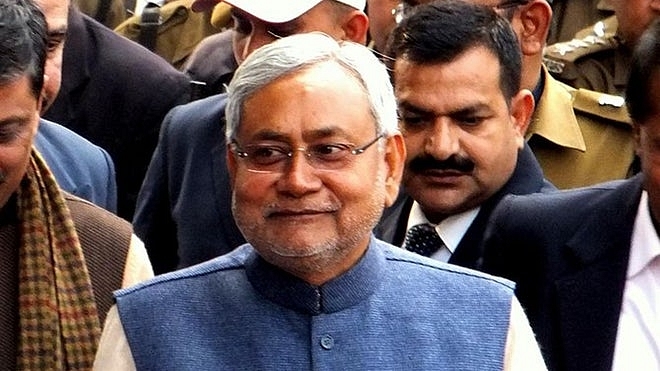Politics
The Great Bihar Experiment: Why Nitish Kumar Returned To The NDA Fold
- For now, the idea of a broad coalition to take on Modi seems to be unlikely, and the BJP occupies pole position in Indian politics today.

Nitish Kumar
Readers of this column will not be surprised by Nitish Kumar's torpedoing of the Mahagathbandhan that had caught the imagination of our country's secular intelligentsia after the drubbing it administered to the Narendra Modi-Amit Shah combine in the autumn of 2015. A lot of commentators then had anointed Kumar as their great white hope to take on the Bharatiya Janata Party (BJP) in 2019. The question that this column seeks to answer is why it is that Kumar disregarded the aspirations and fond wishes of the commentariat and went back to his former alliance partners.
All those who have observed Bihar politics for the past two decades know that Kumar's politics is rooted in caution as well as extremely astute assessment of his own strengths and weaknesses and those of his rivals. My own two bit for whatever it is worth is that in spite of all that the commentariat wrote, and after 2015 Kumar knew that he could not reasonably expect to be the prime ministerial face of an opposition alliance in 2019, especially when such an alliance was almost inevitably going to be led by the Congress party. Even if we were to leave aside the Congress party, there was very little chance that regional satraps like West Bengal Chief Minister Mamata Banerjee, who unlike him has won a bigger state twice on her own steam, would have allowed him to become prime minister.
The jury is still out over the question of as to when it is that this realisation dawned upon Nitish Kumar. However, my sense is that his own mind was clear in this regard even in the run up to 2015. The fact of the matter, and this is something that Kumar and his advisors know full well, is that his party was always much weaker compared to the other two powerhouses of Bihar politics that is the Rashtriya Janata Dal (RJD) and the BJP and this is something that is borne out by the results of the last two elections in 2010 and 2015 respectively when despite being allocated a comparatively larger share of seats, the Janata Dal - United (JDU) strike rate compared unfavourably to the BJP and the RJD respectively.
Despite the fact that the incumbent Prime Minister remains the most popular politician in the country by some distance, if I were strategising for a hypothetical united opposition in the country, I would have had reason to be fairly optimistic. The government's performance on the economic front has been average to good at best and there is absolutely no doubt that a united opposition experiment on the lines of Bihar can and would succeed in other key states like Uttar Pradesh and even Karnataka.
Despite the fact that I am a long standing critic of Kumar's politics, one must give him credit for almost literally killing two birds with one stone over the past couple of years. A rampaging BJP in 2015 has been reduced to a pliant alliance partner at the state level today.
There was no way in hell that a resurgent BJP in 2015 would have offered Nitish Kumar more than 70 odd seats let alone allow him to have the chief ministership if Kumar had allied with it in 2015. Today, the BJP in Bihar is on a much weaker wicket than it was in 2013 when Kumar parted ways with it. Furthermore, the Bihar premier's stature in national politics has also increased manifold as now he is a constituent of the National Democratic Alliance ruling at the Centre. The challenge before the BJP, as iterated in one of my previous pieces is to ensure that its own state unit is not thrown under the bus. For this purpose, it might not be an altogether bad idea to accommodate Kumar at the Centre anytime before 2019 in exchange for the chief ministerial post in Bihar for the BJP.
For now, the idea of a broad coalition to take on Modi seems to have quite literally been consigned to the gutters. And this is where it seems to be destined to remain for sometime now. Rahul Gandhi's amateurish attempts at reconciliation seem to have come a cropper and if the Congress party wishes to have any hope for survival the first thing it needs to do is to stop doing business with the Akhilesh Yadavs and the Nitish Kumars and the Lalu Yadavs of the world.
The BJP has lost elections in the past too and in ignominous fashion at that. However, it occupies pole position in Indian politics today because it has exhibited the mettle to come back strongly after each and every loss as opposed to hitching its wagon to the perceived eventual winner. If you fight you might win or you might lose. However, if you don’t fight, irrespective of who wins, you shall definitely be on the losing side.
Introducing ElectionsHQ + 50 Ground Reports Project
The 2024 elections might seem easy to guess, but there are some important questions that shouldn't be missed.
Do freebies still sway voters? Do people prioritise infrastructure when voting? How will Punjab vote?
The answers to these questions provide great insights into where we, as a country, are headed in the years to come.
Swarajya is starting a project with an aim to do 50 solid ground stories and a smart commentary service on WhatsApp, a one-of-a-kind. We'd love your support during this election season.
Click below to contribute.
Latest